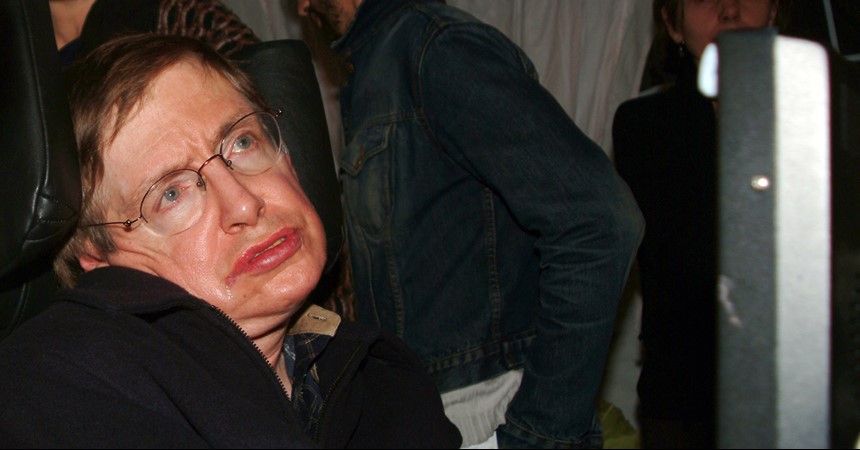Throughout his career, Stephen Hawking was set on bringing together the seemingly-contradictory ideas of faith and science.
Pontifical Academy of Sciences
According to the Pontifical Academy of Sciences, Mr Hawking had met with four successive Popes to ‘advance the relationship between faith and scientific reason’.
As a theoretical physicist, Mr Hawking was adamant about his belief in the non-existence of God. Still, he remained an esteemed member of the Pontifical Academy of Sciences throughout his life. Mr Hawking’s position within the Academy allowed him to foster a fruitful dialogue focusing on science and faith.
The Academy, which Pope Pius IX established in 1847, tweeted, “We are deeply saddened about the passing of our remarkable academician Stephen Hawking who was so faithful to our Academy.”
“He told the four Popes he met that he wanted to advance the relationship between faith and scientific reason. We pray the Lord to welcome him in his Glory,” @CasinaPioIV, the academy, tweeted March 14.
The Vatican observatory, @SpecolaVaticana, also expressed its condolences to Hawking’s family.
“We value the enormous scientific contribution he has made to quantum cosmology and the courage he had in facing illness,” the observatory tweeted in Italian.
Cardinal Vincent Nichols of Westminster tweeted, “We thank Stephen Hawking for his outstanding contribution to science. As a member of the Pontifical Academy of Science, he will be missed and mourned there, too.”
We thank Stephen Hawking for his outstanding contribution to science. As a member of the Pontifical Academy of Science, he will be missed and mourned there too.
— Cardinal Nichols (@CardinalNichols) March 14, 2018
Blessed Paul VI named Hawking a member of the papal academy in 1986. The Academy’s members are chosen on the basis of their academic credentials and professional expertise — not their religious beliefs.
Blessed Paul, the first of four popes to meet Hawking, gave the then 33-year-old scientist the prestigious Pius XI gold medal in 1975 after a unanimous vote by the academy in recognition of his great work, exceptional promise and “important contribution of his research to scientific progress.”
il beato Paolo VI che si inginocchia per consegnare la medaglia di Pio XI e Hawking che ringrazia al Papa per la decorazione pic.twitter.com/zVICFDlkaE
— Casina Pio IV (@CasinaPioIV) March 15, 2018
Pictures from the academy’s archives show the pope kneeling before Hawking, who was seated in a motorised wheelchair, to present him with the medal and touch his head.
Hawking had most recently met Pope Francis when he delivered his presentation on “The Origin of the Universe” at the academy’s plenary session on science and sustainability in 2016.
Francisco saluta all’Accademico PAS Hawking che già più condizionato dalla malattia ha fatto tutto il possibile per incontrarlo pic.twitter.com/GOI9CTcKT8
— Casina Pio IV (@CasinaPioIV) March 15, 2018
Despite his avowed atheism and his belief that God had no role in creating the universe, Stephen Hawking continued the engage in dialogue and debate with the Church as his work and contribution to the papal academy showed.
He also debated on CNN’s “Larry King Live” in 2010 with Jesuit Father Robert Spitzer — a philosopher and educator — over the scientific underpinnings of the beginning of the universe and the theological arguments for the existence of God.
Vatican astronomer, Jesuit Brother Guy Consolmagno, who has studied both physics and philosophy, told Catholic News Service in 2010 that “the ‘god’ that Stephen Hawking doesn’t believe in is one I don’t believe in either.”
“God is not just another force in the universe, alongside gravity or electricity,” he added. “God is the reason why existence itself exists. God is the reason why space and time and the laws of nature can be present for the forces to operate that Stephen Hawking is talking about.”
In the face of adversity
In 1963, as a 21-year-old graduate student, Mr Hawking learned that he had amyotrophic lateral sclerosis, a neuromuscular disease known as Lou Gehrig’s disease. Doctors expected him to live only a few years.
Mr Hawking far outlived his prognosis, though over decades the disease gradually limited his ability to move, eventually to the point where he could only flex one finger and make eye movements. By the 1980s, computer technology had progressed to the point where he could communicate through a computer and voice synthesizer—though with an American accent.
Stephen Barr, a leading Catholic scientists reflected on Stephen Hawking’s success despite his poor health.
“It’s amazing that he was able to do physics at such a high level when for example, most of us write on blackboards and do calculations on pieces of paper. We can hardly imagine being able to do our work when we can’t do those basic things,” he said. “It’s astonishing. It’s simply astonishing. A lot of what he did, he did in his head.”
The British-born theoretical physicist, cosmologist, author and the man considered the most intelligent in the world, passed away at his Cambridge home on March 14 at the age of 76.
